Fresh Produce
The hand-harvested UK-grown spears are specially-selected for their higher-than-normal levels of the amino acid asparagine
Barfoots’ crown jewel asparagus is set to go on sale exclusively at Ocado.
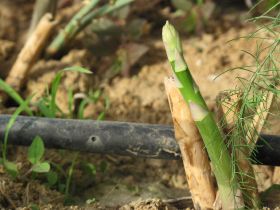
The hand-harvested UK-grown spears are specially-selected for their higher-than-normal levels of the amino acid asparagine which, Barfoots claims, among other attributes, gives it a sweeter and stronger flavour.
The crown jewel line will be exclusive to the online retailer, which also supplies other Barfoots Grown With Love range products, including sweetcorn elotes.
James Meers, business unit director, said: “We were blown away by the success and the amount of interest crown jewel got last year, so I am really excited to see it return.
“The rating system on Ocado gave us direct consumer feedback and five stars out of five tells me this is a product that consumers really get – I am proud that we can say it has been Grown With Love.”
Grape intake reversed stress-related cognitive, behavioural and biochemical deficits, according to a University of Houston study
Results from a study recently published in the Journal of Nutrition Research have suggested that a grape-enriched diet may help over come the effect of stress.
In the study, researchers observed a protective role of grapes on stress-induced anxiety-like behaviours, and learning and memory deficits in an animal model of post traumatic stress, attributed to both gene activation and enhanced antioxidant activity resulting from grape intake.
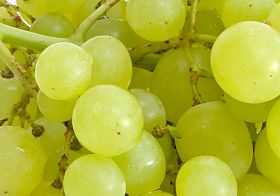
This study, conducted at the University of Houston in the US, investigated the protective role of grapes against stress, and the mechanisms by which grapes achieved this.
For the animals on grape-enriched diets, freeze-dried, whole grape powder was added to the drinking water for 3 weeks, followed by either the stress or control exposure, and then behaviour tests.
The results showed that feeding the animals a grape-enriched diet prior to stress exposure successfully countered the detrimental effects of that stress on brain function and behavior. Specifically, grape intake prevented the memory impairment and anxiety-like behaviors that were observed in the rats with stress but no grapes in their diet.
The researchers propose that the protective benefits of grape consumption start with enhanced antioxidant activity that reduces oxidative stress levels: systemic markers of oxidative stress were reduced in the grape consuming group. Once the oxidative stress is minimised, activation of key genes that help promote the survival of brain nerve cells is triggered.
“Grapes appear to influence several processes that support brain health,” said Samina Salim, the lead investigator. “The potential interplay between grapes’ antioxidant activity and their impact on cell communication is very intriguing to us and we intend to study it further.”
Berry breeders have pooled resources in new programme to trial strawberry and raspberry varieties in the Netherlands
Scottish soft-fruit firm Angus Soft Fruits has partnered with Dutch company Genson BV on a new strategic raspberry and strawberry-breeding programme.
The arrangement between the two companies will see new varieties from Angus Soft Fruit’s breeding programme trialled in the Netherlands.
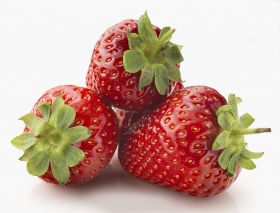
Selected varieties will then be used across all of northern and central Europe, excluding the UK.
Genson BV managing director Marc van Gennip said: “Access to a breeding programme that allows Genson BV to select new varieties to meet the specific requirements of their customer base both for fruit production and retail sales is an exciting new development for the future. Watch this space!”
“The Angus Soft Fruits model is very straight forward,” said Angus Soft Fruits’ R&D director, Dave Griffiths. “Our principal business is as producers of soft fruit. We are very clear that any changes or alterations to the varieties we propose from our breeding programme, offer a significant improvement over currently produced commercial varieties. We are delighted to be working with Genson BV and are excited by the new opportunities this offers everyone involved.”
Van Gennip added: “Over the past year or so, we have reviewed our activities in soft fruit and concluded that we would like to offer more to our customers both at the point of production and the sale of soft fruit.
“We looked at various models of innovation in the soft fruit industry and concluded that the Angus Soft Fruit model was most suited to our requirements. Angus Soft Fruits have, over the years really focused on the needs of their grower base and have demonstrated that an in house programme that has clear objectives can, over a short period of time, provide exciting options for those involved.”
Angus Soft Fruits has produced several successful commercial varieties in the past, including premium variety Ava, day-neutral variety Islay and long-season variety Avarosa.
The company also has several new June-bearer varieties in the final year of selection process for imminent release, as well as new raspberry varieties that show “great commercial potential”.
Sainsbury’s has launched a new range of salads which include edible blossoms and micro-herbs.
The retailer said the move responds to food trends it has identified among its customers.
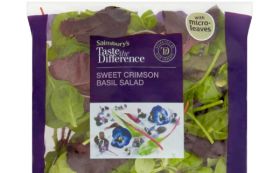
The range includes Taste the Difference (TTD) Sweet Crimson Basil Salad, including micro-leaf crimson basil, colourful baby leaves, and viola flowers; TTD Aromatic Oriental Salad, comprising coriander and purple shiso, with tender baby spinach, sweet red batavia lettuce and tatsoi; TTD Powerful and Punchy Salad, featuring wild rocket and tender baby watercress, with savoury baby red chard, spicy young nasturtium leaves, micro-leaf rocket and radish cress.
Georgina Lunn, Sainsbury’s product developer for fresh produce, said: “We’ve seen a trend for customers making everyday food more exciting, and this new range of salads helps them to create salads which are full of colour, texture and intriguing flavours using more exciting leaves, micro-herbs and even edible flowers.
“We’ve used viola flowers, which have a velvety texture, intense purple colour with a lettuce-like flavour – the perfect finishing touch to a summer salad.”
The new range of bagged salads launch in Sainsbury’s this week from 27 April 2015, and are widely available in store and online priced at £1.75.
Italian apple association Assomela and the French inter-professional organisation Interfel have been awarded more than €2.8m in funding by the European Commission to support a three-year campaign aimed at boosting consumption of apples in non-EU markets.
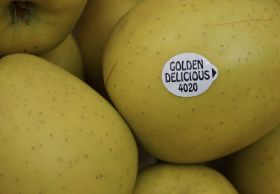
The campaign, which has a combined budget of €5.6m including funds provided by Assomela, Interfel and their own governments, will continue the work carried out by the two organisations as part of a three-year project called European Fresh Attitude, which focused on apples and kiwifruit in so-called third countries.
The results of that project have been described as “extremely positive” by representatives of Assomela, which counts major apple suppliers Vog, VI.P, Melinda and La Trentina among its members.
The aim of the new project is to raise awareness and encourage exports of Italian and French apples to markets in Africa, China, the Middle East, Norway, Russia, South-East Asia and South Korea.
As well as enabling the groups to promote the campaign at key trade events likes World Food Moscow and Asia Fruit Logistica in Hong Kong, the funds will also be used to pay for PR activities at point of sale and at major sporting events in Morocco, Israel and Norway.
Giulia Montanaro, head of international relations at Assomela, welcomed the EC’s decision to renew its financial support for the campaign.
“Consolidating and increasing exports of Italian apples outside the EU is fundamental at a time like this and the project that’s been approved can be a useful tool for our member producer organisations in reaching that objective,” she said.
Montanaro added that the new project’s approval had been made more likely thanks to the good collaboration between Italian and French counterparts over the past few years, a kind of cross-border teamwork that could make it easier to enter new markets in future.
The Dutch marketer has responded to last year’s drop in sales with a major re organisation plan and significant savings in regards to outgoing costs.
Dutch fresh produce giant The Greenery has announced a fall in turnover for the year, with sales dropping from €1.3bn to €1.1bn.
The company attributed the decline to the departure of several growers in late 2013, as well as low prices in Europe during 2014. Such low prices were a result of high volumes on the market, a situation exacerbated by the Russian ban.

During the year, The Greenery made major organisational modifications and cuts in operating costs, including the loss of 350 jobs.
“Compared with 2013, the results show great improvement,” the company said in a statement. “Carrying out the necessary changes has allowed a lean core company to emerge. Opting to pursue a retail strategy was a credible decision, which has generated growth potential.”
In 2014, The Greenery saw growth in direct turnover of 13 per cent to retail partners in the Netherlands. Stricter procedures were applied to minimise decay, and steps taken to achieve a high degree of standardisation at the company’s three distribution centres.
“As a result,” it stated, “the number of inter-site shipments could be reduced by 30%. Thanks to these measures, the reliability of delivery to retail customers increased to 99%. By using more of the sorting and packaging capacity at qualified grower locations, 2 per cent more volume was shipped directly from the growers to the customers’ distribution centres.”
Within Europe, The Greenery revealed plans to focus on the Netherlands, Germany and the UK and to continue to increase cooperation with retailers in those markets.
Meanwhile, the loss of the Russian market has encouraged the company to expand in new markets such as China. “In 2014, this got off to a good start when the company delivered 247,000 pears there,” The Greenery stated.
First British strawberries are available a week earlier than usual, with growers on the outskirts of Cardiff one step ahead of the rest
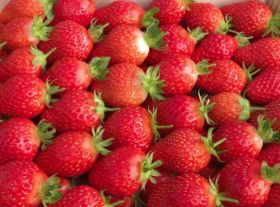
As a result of a generally mild winter; growers have produced the first British strawberries – a week earlier than usual.
These berries, on their way to retailers such as Tesco across the UK, also mark the first time ever that Wales has successfully produced the UK’s earliest strawberries, ahead of the likes of Kent, Sussex and Hampshire.
The variety of these early season Welsh-grown strawberries, grown in the Rhymney Valley, near Cardiff, is called ‘Driscoll’s Lusa’ and have been selected because of their consistent, sweet taste.
Organic Trade Board chair claims lack of cohesion on organic products in leading supermarkets is holding market back
Leading grocery retailers in the UK need to start developing a strategy when it comes to organics, according to the head of the Organic Trade Board (OTB).
Paul Moore was speaking at yesterday’s (4 March)’s Prosper and Grow With Organic event, which saw presentations from – among others – discounter Netto, the leading organic retailer in Denmark, a country which boasts the highest per capita consumption of organic food in the world.
The latest Organic Food Usage and Attitudes Research survey was also revealed at the event. This showed that 48% of UK households claim to have bought organic food in the last year, with 38% of British households claiming they buy organic produce monthly.
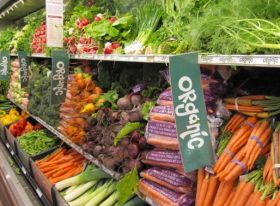
The research also found that 37% of organic consumers will buy the products irrespective of price, and that 90% of those surveyed who don’t buy organic products on a regular basis said that they would buy organic fruit if they were going to start buying more organic food items, with 86 per cent giving the same affirmative answer about organic veg.
But, as Catherine Fookes, campaign manager at OTB noted after the survey results were revealed: “The key message to retailers is expand your range, as if you make organics available to everyone, your sales will change.”
Moore added: “I would argue there’s no strategy around organics at the leading retailers – it’s just decided by individual category buyers. They need to do a Netto and make a step-change, as a strategy is the missing piece in the puzzle.
“It’s not just a case of ‘build it and they’ll come’, though. Retailers are very big, and they have lots of requests on their time, and we hope suppliers now have the confidence and data needed to try and get retailers to stock their products.”
One of the points emphasised to attendees – mostly organic producers and suppliers – was that organic shoppers have a higher basket spend than non-organic shoppers, and thus, the leading retailers are losing out on business to such consumers, who are taking their trade to the likes of Ocado.
Speaking earlier on at the event, Thor Jørgensen, chief operating officer at Netto International, which hopes to have 15 stores opened in the north of England by the end of this year as part of a venture with Sainsbury’s, said retailers having a large organic range is essential to keeping current organic customers in and enticing new ones to the market.
Jørgensen also praised the support organic produce has received from the Danish government for more than two decades, support the UK organic industry widely believes that it is lacking from Westminster. Eight per cent of food and drink sales in Denmark are organic – that’s compared to just under 2% in the UK, as revealed by last week’s Soil Association Organic Market Report 2015.
Klaus Arntz, chief marketing officer at Wessanen, famous for products such as Clipper tea, also spoke at the event. He illustrated the fact that leading retailers in continental Europe have separate shelves and sections for organic produce in their stores, as opposed to most UK grocery giants, who sell the products among their non-organic counterparts.
A £600,000 mixture of digital, print, press and underground advertising to target more than five million on-the-go health-conscious foodies
Florette will be producing a super-powered marketing campaign to mark the launch of its Baby Kale range.
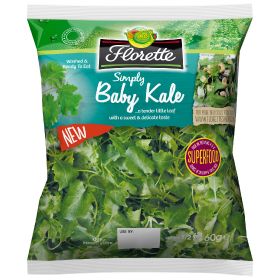
A £600,000 mixture of digital, print, press and underground advertising to target more than five million on-the-go health-conscious foodies.
Identified as ‘new wave healthies’, the salad brand believes these consumers have helped to shape Florette’s super-powered marketing strategy.
Florette will be attempting to spark kale conversation across social media, targeting foodies with adverts in publications such as “The Times”, as well as launching a high impact 48-sheet poster campaign coupled with digital escalator advertising across London’s underground.
Elaine Smith, marketing controller at Florette, said: “More consumers than ever are realising the benefits of superfoods and with continued celebrity endorsement, curly kale is a firm favourite. Our latest creation puts a spin on this popular super leaf, which in its traditional form has to be cooked before eating. Baby Kale can be eaten raw in salads and smoothies – as well as being cooked, so it’s never been easier to enjoy all the health benefits of kale.
“For today’s busy consumer, convenience is essential and we wanted our marketing campaign to reflect this by targeting on-the-go foodies, whilst also inspiring them to get creative with their kale. By combining digital buzz with print, press, as well as billboard advertising in high footfall areas, we will be able to do just that and look forward to launching this exciting campaign in the New Year.”
Last year, curly kale was purchased over 14 million times, and the salad specialist believes this opens up a £3.3 million opportunity for the single leaf sector.
Smith added: “We believe that the positive positioning as a versatile ingredient, as a well as a superfood, will help to deliver incremental purchase occasions and incremental cash value to the rest of the single salad leaf category.”
Baby Kale is on sale now in 60g bags at an RRP of £1.29 in Tesco, Sainsbury’s, Ocado and Waitrose, as well as other retailers.